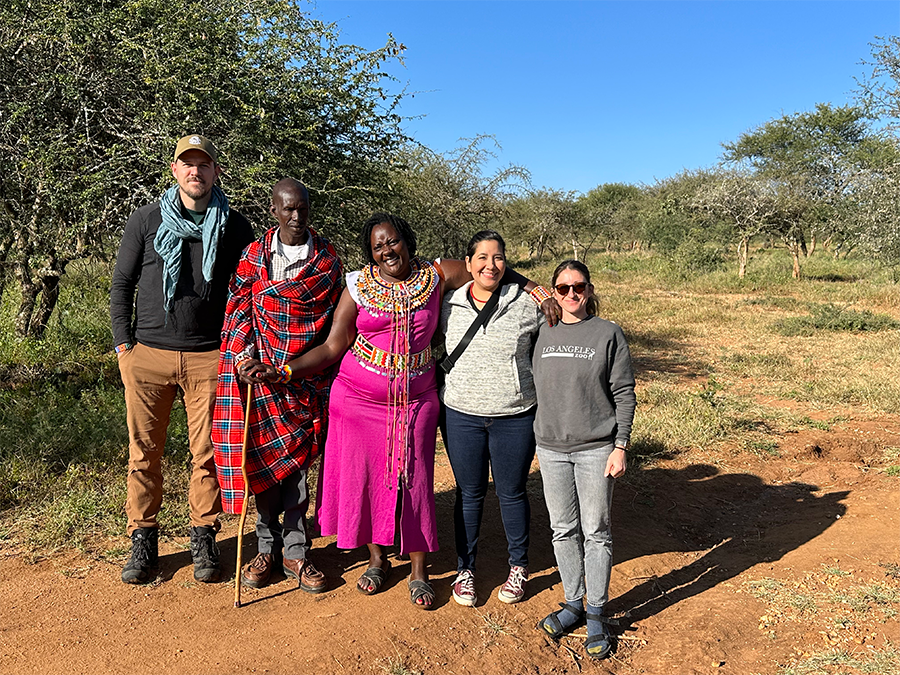Summary of Field Notes: Kenya – Los Angeles Zoo and Botanical Gardens:
The L.A. Zoo is partnering with the African Conservation Centre (ACC) to develop the Noonkotiak Resource Centre near Amboseli National Park in Kenya. This center aims to be a knowledge hub focusing on the Amboseli ecosystem research, Maasai cultural experiences led by women, and educational resources for local and international students. Zoo team members traveled to Kenya for site visits and to engage with partners and community members. They emphasized respect for local practices and aimed to build a project that supports community goals and conserves biodiversity. The Noonkotiak Centre will include an Environmental Education and Visitor Centre, a Research Monitoring and Knowledge-Sharing Centre, and a Maasai Women’s Cultural Tourism Centre. The project seeks to advance community livelihoods, manage resources sustainably, and promote human-wildlife coexistence while preserving biodiversity by integrating Maasai knowledge and engaging local and international communities. The visit highlighted the importance of personal connections, mutual learning, and respect in building a successful partnership.
The partnership between the L.A. Zoo and the African Conservation Centre (ACC) aims to establish the Noonkotiak Resource Centre in Kenya to foster community-based conservation.
– The focus on involving the local Maasai community, including women-led cultural experiences, embeds local knowledge and traditions into conservation efforts.
– The Noonkotiak Resource Centre’s three primary objectives include environmental education, research monitoring, and promoting Maasai women’s cultural tourism.
– Establishing trust and building meaningful partnerships with local communities are vital for the success of conservation initiatives.
– Evaluation and evidence-based conservation strategies are integral to measure the effectiveness of the project and ensure its sustainability.
In recent years, the Los Angeles Zoo and Botanical Gardens have embarked on a pioneering mission in collaboration with the African Conservation Centre (ACC) to revolutionize community-based conservation efforts within Kenya. This ambitious project, centered around creating the Noonkotiak Resource Centre near Amboseli National Park, exemplifies the zoo’s commitment to global conservation and environmental education. The initiative represents a significant stride towards integrating sustainable practices with cultural preservation, highlighting the critical role of local communities in conservation successes.
The partnership’s core ambition is to establish the Noonkotiak Resource Centre as a beacon of knowledge and cultural exchange. This center aims to serve as a hub for research on the Amboseli ecosystem, offer Maasai-guided cultural experiences, and provide educational resources for students worldwide. Such a multifaceted approach ensures that biodiversity conservation goes hand in hand with the empowerment and active involvement of the local Maasai community, thus fostering a symbiotic relationship between humans and wildlife.
A significant aspect of this collaboration is the emphasis on gender inclusion, particularly through the promotion of Maasai women-led initiatives within the Maasai Women’s Cultural Tourism Centre segment of the project. This component aims to offer visitors a profound understanding of the Maasai way of life and empowers women by providing them with a platform to showcase their culture and contribute to the local economy. The project paves the way for a holistic approach to environmental stewardship by intertwining wildlife conservation with cultural preservation and community development.
Building trust and forging deep-rooted partnerships with the local communities have been foundational principles of this initiative. Recognizing the historical exclusion and marginalization of local voices in conservation narratives, the Los Angeles Zoo and ACC representatives have prioritized respect, mutual understanding, and open dialogue in their engagement with the Maasai community. Meetings under the acacia trees, embracing local customs, and genuinely listening to the community’s needs and aspirations manifest a profound respect for local traditions and wisdom. Such practices underscore the importance of collaborative efforts based on equality, respect, and shared vision.
Indeed, undertaking conservation projects, especially those entailing cross-continental partnerships, demands meticulous planning, adaptability, and a comprehensive evaluative framework to ascertain their impact. The Noonkotiak Resource Center initiative stands out for its commitment to evidence-based conservation. Through rigorous evaluation of the physical infrastructure and the programs initiated, the project’s stakeholders aim to ensure the venture meets and exceeds its conservation and community development objectives. This evidence-based approach is crucial for validating the strategies’ effectiveness and serves as a valuable blueprint for similar projects globally.
The Los Angeles Zoo and Botanical Gardens’ involvement in the Field Notes: Kenya project marks a significant step towards redefining traditional conservation efforts. By placing community engagement, cultural preservation, gender inclusion, and evidence-based strategies at the heart of their mission, the L.A. Zoo and ACC partnership exemplifies a forward-thinking approach to conservation. This project is a testament to collaborative efforts’ power in fostering sustainable relationships between humans and nature. Through continuous engagement, evaluation, and adaptation, the Noonkotiak Resource Centre is poised to impact Kenya’s conservation landscape, offering vital lessons for global biodiversity preservation efforts.


